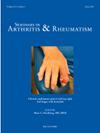A cohort study on the associations between age at natural menopause and rheumatoid arthritis in postmenopausal women from the Canadian Longitudinal Study on Aging
IF 4.4
2区 医学
Q1 RHEUMATOLOGY
引用次数: 0
Abstract
Menopause represents a significant phase in a woman’s life, marked by profound physiological changes. An early onset of menopause has been associated with a variety of negative outcomes. Estrogen has been shown to be protective of bone and joint health. Hormonal links to rheumatoid arthritis have been found; previous studies exploring age at natural menopause (ANM) and Rheumatoid arthritis have produced conflicting results. This study investigated the association between ANM and incidence of rheumatoid arthritis among postmenopausal Canadian women. The study included women between the ages of 45–85 years from the Canadian Longitudinal Study on Aging followed over a 10-year period. Analysis was restricted to naturally postmenopausal women that did not have rheumatoid arthritis prior to menopause. ANM was examined using the following categories ≤ 44 (reference), 45–49, and ≥50. Survival analysis was used to determine time to onset of rheumatoid arthritis. Unadjusted and adjusted multivariable Cox regression models were used to examine the relationship between ANM and incidence of rheumatoid arthritis. The adjusted multivariable Cox regression model showed significantly lower risk of rheumatoid arthritis in women with an older ANM of ≥50 years and who have been on hormone replacement therapy for ≥8 years with a hazard ratio of 0.2 (95 % CI: 0.1–0.7) compared to women with an ANM ≤ 44 who have never used hormone replacement therapy. Our findings suggest a potential beneficial effect of longer estrogen exposure on the risk of developing rheumatoid arthritis.
一项来自加拿大衰老纵向研究的关于绝经后妇女自然绝经年龄与类风湿关节炎之间关系的队列研究
更年期是女性生命中一个重要的阶段,以深刻的生理变化为标志。早绝经与各种负面结果有关。雌激素已被证明可以保护骨骼和关节健康。激素与类风湿关节炎的关系已经被发现;先前关于自然绝经年龄(ANM)和类风湿关节炎的研究产生了相互矛盾的结果。本研究调查了加拿大绝经后妇女ANM与类风湿关节炎发病率之间的关系。这项研究包括了年龄在45-85岁之间的女性,她们来自加拿大老龄化纵向研究,随访时间长达10年。分析仅限于绝经前没有风湿性关节炎的自然绝经后妇女。ANM采用≤44(参考)、45-49和≥50的分类进行检查。生存分析用于确定类风湿关节炎发病的时间。采用未调整和调整的多变量Cox回归模型检验ANM与类风湿关节炎发病率之间的关系。调整后的多变量Cox回归模型显示,ANM≥50岁且接受激素替代治疗≥8年的女性患类风湿关节炎的风险显著低于ANM≤44且从未使用激素替代治疗的女性,风险比为0.2 (95% CI: 0.1-0.7)。我们的研究结果表明,长时间的雌激素暴露对类风湿关节炎的风险有潜在的有益影响。
本文章由计算机程序翻译,如有差异,请以英文原文为准。
求助全文
约1分钟内获得全文
求助全文
来源期刊
CiteScore
9.20
自引率
4.00%
发文量
176
审稿时长
46 days
期刊介绍:
Seminars in Arthritis and Rheumatism provides access to the highest-quality clinical, therapeutic and translational research about arthritis, rheumatology and musculoskeletal disorders that affect the joints and connective tissue. Each bimonthly issue includes articles giving you the latest diagnostic criteria, consensus statements, systematic reviews and meta-analyses as well as clinical and translational research studies. Read this journal for the latest groundbreaking research and to gain insights from scientists and clinicians on the management and treatment of musculoskeletal and autoimmune rheumatologic diseases. The journal is of interest to rheumatologists, orthopedic surgeons, internal medicine physicians, immunologists and specialists in bone and mineral metabolism.

 求助内容:
求助内容: 应助结果提醒方式:
应助结果提醒方式:


